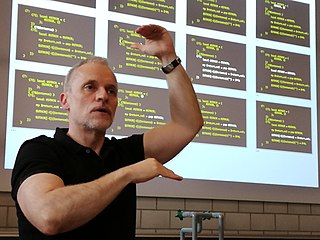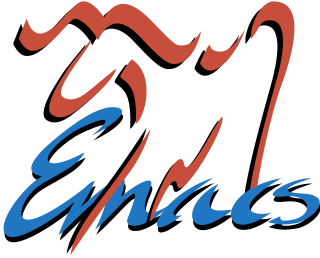Related Research Articles
The editor war is the rivalry between users of the Emacs and vi text editors. The rivalry has become a lasting part of hacker culture and the free software community.

An integrated development environment (IDE) is a software application that provides comprehensive facilities to computer programmers for software development. An IDE normally consists of at least a source code editor, build automation tools and a debugger. Some IDEs, such as NetBeans and Eclipse, contain the necessary compiler, interpreter, or both; others, such as SharpDevelop and Lazarus, do not.

Perl is a family of two high-level, general-purpose, interpreted, dynamic programming languages. "Perl" refers to Perl 5, but from 2000 to 2019 it also referred to its redesigned "sister language", Perl 6, before the latter's name was officially changed to Raku in October 2019.

A regular expression is a sequence of characters that specifies a search pattern. Usually such patterns are used by string-searching algorithms for "find" or "find and replace" operations on strings, or for input validation. It is a technique developed in theoretical computer science and formal language theory.

Vim is a clone, with additions, of Bill Joy's vi text editor program for Unix. Vim's author, Bram Moolenaar, based it on the source code for a port of the Stevie editor to the Amiga and released a version to the public in 1991. Vim is designed for use both from a command-line interface and as a standalone application in a graphical user interface. Vim is free and open-source software and is released under the Vim license that includes some charityware clauses, encouraging users who enjoy the software to consider donating to children in Uganda. The Vim license is compatible with the GNU General Public License through a special clause allowing distribution of modified copies under the GNU GPL-2.0-or-later license.
HTML-Kit is a proprietary HTML editor for Microsoft Windows made by chami.com. The application is a full-featured HTML editor designed to edit, format, validate, preview and publish web pages in HTML, XHTML and XML -languages.

Programming Perl, best known as the Camel Book among programmers, is a book about writing programs using the Perl programming language, revised as several editions (1991-2012) to reflect major language changes since Perl version 4. Editions have been co-written by the creator of Perl, Larry Wall, along with Randal L. Schwartz, then Tom Christiansen and then Jon Orwant. Published by O'Reilly Media, the book is considered the canonical reference work for Perl programmers. With over 1,000 pages, the various editions contain complete descriptions of each Perl language version and its interpreter. Examples range from trivial code snippets to the highly complex expressions for which Perl is widely known. The camel book editions are also noted for being written in an approachable and humorous style.
In the written form of many languages, an indentation or indent is an empty space at the beginning of a line to signal the start of a new paragraph. Many computer languages have adopted this technique to designate "paragraphs" or other logical blocks in the program.
Ctags is a programming tool that generates an index file of names found in source and header files of various programming languages to aid code comprehension. Depending on the language, functions, variables, class members, macros and so on may be indexed. These tags allow definitions to be quickly and easily located by a text editor, a code search engine, or other utility. Alternatively, there is also an output mode that generates a cross reference file, listing information about various names found in a set of language files in human-readable form.
Maven is a build automation tool used primarily for Java projects. Maven can also be used to build and manage projects written in C#, Ruby, Scala, and other languages. The Maven project is hosted by the Apache Software Foundation, where it was formerly part of the Jakarta Project.
This article provides basic comparisons for notable text editors. More feature details for text editors are available from the Category of text editor features and from the individual products' articles. This article may not be up-to-date or necessarily all-inclusive.

Damian Conway is a computer scientist, a member of the Perl and Raku communities, a public speaker, and the author of several books. Until 2010, he was also an adjunct associate professor in the Faculty of Information Technology at Monash University.

Blosxom is a free-software weblog program written in Perl by Rael Dornfest. It uses the pre-existing file system instead of a database management system, unlike most blog software.
Coding conventions are a set of guidelines for a specific programming language that recommend programming style, practices, and methods for each aspect of a program written in that language. These conventions usually cover file organization, indentation, comments, declarations, statements, white space, naming conventions, programming practices, programming principles, programming rules of thumb, architectural best practices, etc. These are guidelines for software structural quality. Software programmers are highly recommended to follow these guidelines to help improve the readability of their source code and make software maintenance easier. Coding conventions are only applicable to the human maintainers and peer reviewers of a software project. Conventions may be formalized in a documented set of rules that an entire team or company follows, or may be as informal as the habitual coding practices of an individual. Coding conventions are not enforced by compilers.

In computer programming, a comment is a programmer-readable explanation or annotation in the source code of a computer program. They are added with the purpose of making the source code easier for humans to understand, and are generally ignored by compilers and interpreters. The syntax of comments in various programming languages varies considerably.

GNU Emacs is a free software text editor. It was created by GNU Project founder Richard Stallman. In common with other varieties of Emacs, GNU Emacs is extensible using a Turing complete programming language. GNU Emacs has been called "the most powerful text editor available today". With proper support from the underlying system, GNU Emacs is able to display files in multiple character sets, and has been able to simultaneously display most human languages since at least 1999. Throughout its history, GNU Emacs has been a central component of the GNU project, and a flagship of the free software movement. GNU Emacs is sometimes abbreviated as GNUMACS, especially to differentiate it from other EMACS variants. The tag line for GNU Emacs is "the extensible self-documenting text editor".

Emacs or EMACS is a family of text editors that are characterized by their extensibility. The manual for the most widely used variant, GNU Emacs, describes it as "the extensible, customizable, self-documenting, real-time display editor". Development of the first Emacs began in the mid-1970s, and work on its direct descendant, GNU Emacs, continues actively as of 2021.
A scripting language or script language is a programming language for a runtime system that automates the execution of tasks that would otherwise be performed individually by a human operator. Scripting languages are usually interpreted at runtime rather than compiled.
The following outline is provided as an overview of and topical guide to the Perl programming language:
References
- ↑ Perl Style Guide
- ↑ "Padre::Plugin::PerlTidy Plugin for Padre". Archived from the original on 2012-04-24. Retrieved 2011-11-01.
- ↑ "PerlTidy for Emacs". Archived from the original on 2018-03-04. Retrieved 2011-11-01.
- ↑ Perltidy Online
- ↑ "PerlTidy configurations from Perl Best Practices". Archived from the original on 2018-03-04. Retrieved 2011-11-01.